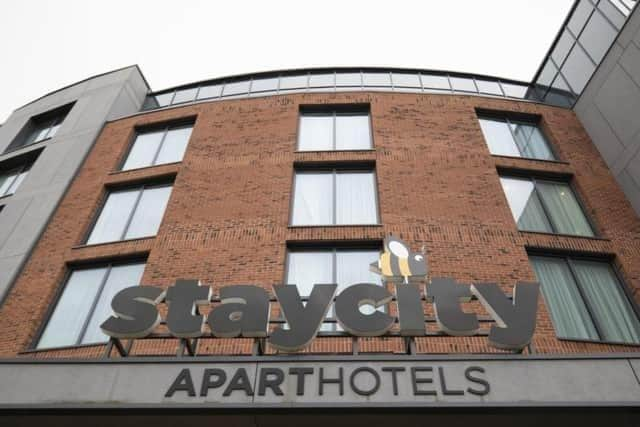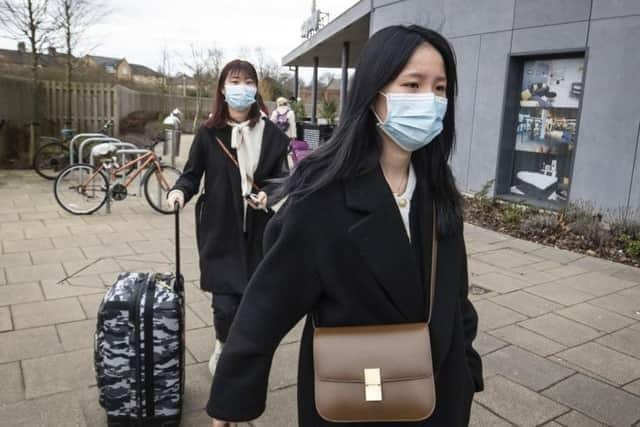Life in lockdown: How Yorkshire was ground zero for a spring and summer of heartbreak
On the evening of January 29 2020, Yorkshire became ground zero of the pandemic that would plunge Britain into its gravest peacetime crisis.
Paramedics wearing full biological protection suits arrived at the Staycity hotel in Paragon Street, York, following a call to the NHS 111 helpline from a 23-year-old Chinese man staying there with his 50-year-old mother.
Advertisement
Hide AdAdvertisement
Hide AdThe man, a student at the University of York, and his mother had developed fever, coughs and muscle pain. They had recently arrived from the Chinese province of Wuhan, where deaths from a previously unknown respiratory illness were already being reported.


The paramedics took them out of the hotel through a fire exit and into a waiting ambulance which was bound for an infectious diseases unit at Castle Hill Hospital, near Hull.
Britain had its first confirmed cases of coronavirus. Others rapidly followed and within weeks, isolated infections had exploded into a pandemic killing hundreds every day that left a frightened country wondering what lay ahead as life came to a standstill with the lockdown order four years ago today.
The sense of a deepening crisis intensified throughout February as each day brought yet more cases and as March progressed every familiar aspect of how Britain lived began to be affected.
Advertisement
Hide AdAdvertisement
Hide AdSchools closed, except for the children of key workers, the Premier League was suspended and local elections cancelled.


Then came the panic buying – queues of tense, anxious people snaking around supermarket car parks long before opening time, waiting to charge inside and clear the shelves.
A peculiar mania for stockpiling toilet rolls developed, and supplies of pasta and flour were snapped up as soon as they appeared, as were remedies for coughs and colds, as shoppers convinced themselves that they could be holed up at home for months.
The stampedes caused particular difficulties for the elderly, who arrived at supermarkets to find either nothing left or a struggle to compete with greedy younger people determined to grab whatever they could.
Advertisement
Hide AdAdvertisement
Hide AdBut it was not only older people who fell victim to the panic. The anger, worry and frustration it caused were voiced by York nurse Dawn Bilbrough in a tearful video that went viral.
She wept after finishing a gruelling 48-hour shift only to find supermarket shelves stripped bare when she tried to buy food on her way home.
“So I’ve just come out of the supermarket,” she said. “There’s no fruit and veg and I had a little cry in there.
“I’m a critical care nurse and I’ve just finished 48 hours of work and I just wanted to get some stuff in for the next 48 hours. There’s no fruit, there’s no vegetables and I just don’t know how I’m supposed to stay healthy.
Advertisement
Hide AdAdvertisement
Hide Ad“Those people who are just stripping the shelves of basic foods, you just need to stop it because it’s people like me that are going to be looking after you when you are at your lowest and just stop it, please.”
As cases soared, the over 70s were advised to stay at home and avoid contact with others.
The NHS risked being overwhelmed, and the Government began converting conference centres – including Harrogate’s - into Nightingale hospitals providing thousands of emergency beds.
Scheduled surgery was cancelled and a call went out for retired NHS staff to return, which was answered by 20,000 doctors and nurses.
Advertisement
Hide AdAdvertisement
Hide AdAnd in a massive display of community spirit, an appeal for 250,000 NHS volunteers to help the vulnerable and isolated was answered by three times that number – an army of three-quarters of a million people eager to do their bit.
When Boris Johnson broadcast to the nation on March 23 and Britain went into lockdown, tens of millions embraced the message that represented the fightback against the virus - Stay Home, Protect the NHS, Save Lives.
Three days later, Britain found its soundtrack to the crisis – and a very public display of thanks to those on the frontline of looking after the ill and vulnerable.
The evening of March 26 rang to the thunder of applause and cacophonous clattering of pots and pans beaten with wooden spoons which was the first Clap for Carers.
Advertisement
Hide AdAdvertisement
Hide AdThis outpouring of gratitude to NHS and care staff was the brainchild of Annemarie Plas, a Dutch citizen living in London and it continued every Thursday evening for weeks.
There were many inspirational figures during that first lockdown – in hospitals, in care homes, in communities – but one above all others captured the hearts of the nation and became an emblem of Britain’s determination to do all it could to support the NHS as it faced its greatest challenge.
On April 6, 99-year-old Captain Tom Moore, born in Keighley, set out to walk 100 laps of his Bedfordshire garden, aiming to raise £1,000 for NHS Charities Together.
Resolute and dapper in blazer with regimental badge and campaign medals, Captain Tom, with the aid of his walking frame, paced steadily towards his goal.
Advertisement
Hide AdAdvertisement
Hide AdLockdown Britain soon woke up to the resolve of this grand old soldier and donations flooded in. The eventual total was a phenomenal £32.79m, reached on April 20, his 100th birthday.
In recognition, it was announced that he would become Captain Sir Tom Moore, and on a sun-soaked July 17, he was knighted by Queen Elizabeth at Windsor in her first in-person engagement since lockdown.
As the lockdown dragged on, Britain basked in the warmest May on record and living with the threat of Covid became the new normal.
The country looked and talked differently from just a few weeks before. The look had much to do with hairdressers being closed down for six weeks and DIY attempts at cuts that varied in their success.
Advertisement
Hide AdAdvertisement
Hide AdTalking differently was due to the whole new vocabulary that sprang up overnight.
Where once people discussed football, now the talk was all about the R number – the rate at which infections multiplied - or WFH, PPE, support bubbles, shielding, self-isolation and social distancing.
Zoom was on the lips of everybody who was WFH too, not only for bringing distant colleagues together, but for being a gift to the nation’s nosey instinct for peering over a fellow-worker’s shoulder at their taste in home decor or pictures on the wall.
Britain embraced video calling and friends joined each other online for virtual drinks and dinner parties, kept in shape with fitness guru Joe Wicks’ daily workouts on YouTube, or danced along to singer Sophie Ellis-Bextor’s kitchen disco.
Advertisement
Hide AdAdvertisement
Hide AdA widespread feeling of solidarity was in the air, and a new neighbourliness, as people came to know each other better over long weeks of being at home.
Older or vulnerable people were looked out for and helped, visited and their shopping delivered to doorsteps. There was talk of a Blitz spirit once more, as the country felt under siege by a ruthless enemy.
The feeling that everybody needed to pull together was reinforced by the grimmest of milestones, which was reached on May 5 – Britain had recorded 32,313 deaths, the highest number in Europe.
But by the end of that month, hope that the worst could be over was gaining the upper hand over despair. The rate of new infections was slowing, and the first tentative steps were taken towards easing restrictions.
Advertisement
Hide AdAdvertisement
Hide AdMembers of different households were allowed to meet outdoors, enabling reunions between people who had been kept apart for 10 weeks.
There was a long way to go before Britain could feel life was anything like back to normal. But as summer 2020 arrived, the country had new confidence that whatever Covid still had to throw at us, we’d beat it.
Comment Guidelines
National World encourages reader discussion on our stories. User feedback, insights and back-and-forth exchanges add a rich layer of context to reporting. Please review our Community Guidelines before commenting.